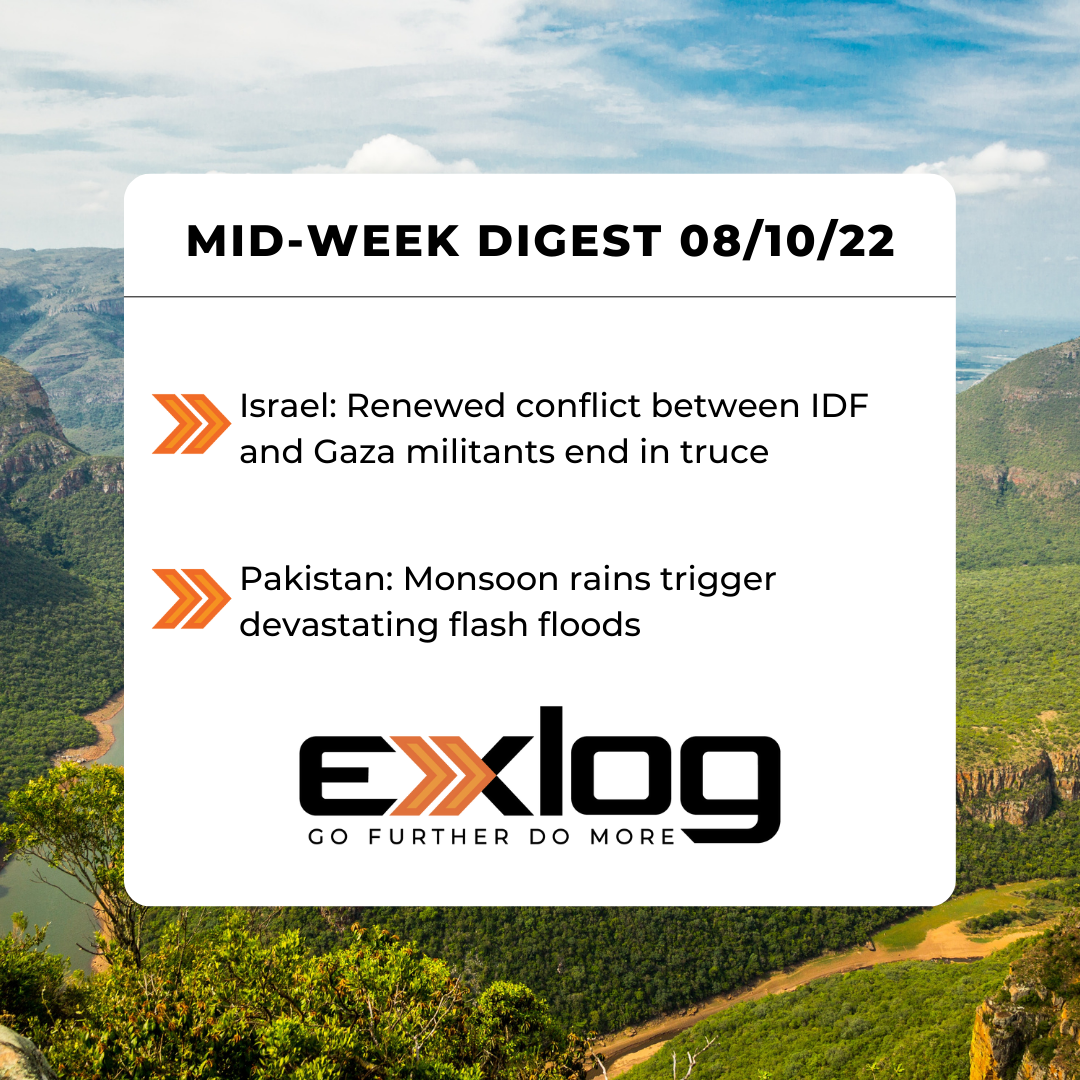Ceasefire Deescalates Israel-Gaza Hostilities and Devastating Flooding Across Pakistan
Israel: Renewed Conflict Between IDF and Gaza Militants Ends in Truce
Israel and Palestinian Islamic Jihad (PIJ) militants in Gaza agreed to a ceasefire on Aug. 7 following a three-day conflict that marked the deadliest escalation of hostilities in the area since the 11-day war in May 2021. Although the ceasefire appears to be holding, tensions remain elevated due to other recent Israeli counterterrorism operations in Palestinian-controlled areas of the West Bank. The fighting began on Aug. 5, when Israeli Defense Forces (IDF) launched preemptive airstrikes against PIJ targets in Gaza, claiming that the militant group was planning an imminent attack on Israel in retaliation for the recent arrest and imprisonment of the group’s leader in the West Bank, Bassam al-Saadi. The UN reports that the IDF launched 147 airstrikes against militants in Gaza, killing at least 46 people and injuring 360 others. At least 40 families in the Gaza Strip were displaced, and an estimated 650 housing units were damaged in the conflict. The PIJ also incurred significant losses – two of the group’s key leaders were killed, and many of its weapons factories and operational centers were destroyed. In response to the IDF strikes, Palestinian militants fired 1,100 rockets and mortars toward Tel Aviv and Jerusalem, although Israel’s Iron Dome intercepted most of the rockets, and none landed in densely populated urban areas; however, 70 Israelis suffered injuries from falling debris and minor structural damage was reported. Although the Egyptian-brokered ceasefire was not accompanied by peace talks between Palestinian and Israeli leaders, the truce ended movement restrictions at the Erez and Kerem border crossings – imposed by Israeli authorities on Aug. 2 – which had prevented the delivery of essential goods and services to Gaza. Since Palestine’s largest militant group, Hamas, seized control of the Gaza Strip in 2007, there have been six major conflicts between Palestinians and Israelis – all of which involved the coalition of Hamas and PIJ fighting against the IDF. Hamas did not engage in the most recent hostilities likely due to the fear of harming the economic cooperation with Israel, which has created tensions between the two militant groups. While the truce appears to have ended the three-day conflict in Gaza, the IDF has conducted several counter-terrorism operations targeting PIJ in the West Bank in recent days, killing at least three militants – including a local commander – and injuring 40 civilians. Continued IDF raids targeting Palestinian armed groups and their leadership in the West Bank are likely to be viewed as an escalation by both militant groups and ordinary Palestinians (due to the civilian casualties), increasing the threat of civil unrest and terrorist attacks against Israeli targets in the near term.
Pakistan: Monsoon Rains Trigger Devastating Flash Floods
Flash floods triggered by heavy monsoon rains have resulted in hundreds of casualties, internal displacement, and extensive damage to infrastructure and private property across Pakistan over the past several weeks. Since the start of monsoon season on June 14, 573 people have died and 939 others have been injured due to the flooding, with the death toll likely to climb in the days ahead. The provinces of Sindh and Balochistan have witnessed the most destruction; both regions have recorded three times their annual average rainfall since the beginning of the monsoon season. The National Disaster Management Authority (NDMA) reported that 49,991 houses have been damaged or destroyed, with 88% of the damaged properties located in Sindh and Balochistan. Various government and humanitarian aid organizations in cooperation with the Pakistani Army have been conducting search and rescue operations in flood-stricken villages and have established relief camps providing food, shelter, and medicine to the affected population. Among more than 23,000 internally displaced people (IDPs) temporarily residing in relief camps across the country, 19,917 IDPs have been registered in Sindh, Balochistan, and Punjab. Flooding has also killed approximately 25,065 livestock and destroyed thousands of acres of farmland, which will have a lasting impact on the livelihood of farmers and local economies. Power and communication outages have occurred throughout the country as flash floods have damaged or swept away electrical transformers. Flooding has also destroyed more than 2,800 km (1,739 mi) of roads and 119 bridges, complicating relief efforts. The NDMA has reported that rains are expected to intensify from Aug. 10 and will likely continue until at least Aug. 13, threatening further infrastructure and property damage and additional casualties.


